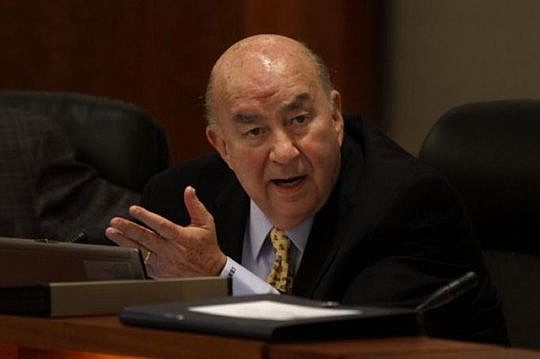
State officials, education leaders, family and friends gathered Friday at Florida State University to remember Charles B. Reed, who died in December after serving 27 years as the leader of two of the largest university systems in the nation.
“There will never be another Charlie Reed. He was one of a kind,” former Gov. Bob Graham said in a statement.
Graham, who could not attend the ceremony because he had the flu, helped Reed, who was his chief of staff, become chancellor of the Florida university system in 1985, a post Reed held for 13 years.
In 1998, Reed became chancellor of the California State University system where he served until 2012, when he retired as chancellor emeritus and returned to Tallahassee.
Reed, who died at age 75, had also served as Graham’s education adviser before becoming his chief of staff and the two had met in the early 1970s when Graham was chairman of the state Senate education panel and Reed was working in the Department of Education.
“From those beginnings in state government, Charlie became a giant in higher education in two of the largest three states in our nation,” Graham said.
After Graham went to the U.S. Senate, where he served 18 years, he said he always asked his staff one question if they were dealing with a higher education issue. “Have we asked Charlie Reed what he thinks about this?” Graham said.
Graham’s statement was read by former South Carolina Gov. Richard Riley, who was another friend of Reed and who served as U.S. secretary of education under President Bill Clinton.
“He was truly a very strong decision maker,” Riley said. “He had a big heart and a sharp mind.”
Riley said while Reed adroitly managed the Florida and California higher-education systems, he always kept his focus on helping students, “especially those who had very few opportunities.”
In fact, one of the Reed quotes his family selected for his memorial program was: “I don’t give a damn if you don’t like it, it’s the right thing for the students.”
Several speakers recalled Reed’s blunt, hard-working leadership style, described as his “brisk, cordial ways,” drawing laughter from many in the crowd.
“Don’t assume. No excuses. I can hear that voice like it was yesterday,” said Ash Williams, director of Florida’s pension fund who served as a deputy chief of staff in Graham’s office under Reed.
Duby Ausley, former chairman of the old Board of Regents, which was similar to the university system’s current Board of Governors, recalled trying to get Reed, a one-time college football player who had a doctorate from George Washington University, to adopt a more formal title like “Dr. Reed.”
“We all know it didn’t work. It was: Charlie,” Ausley said.
Among his achievements while he was the Florida chancellor, Ausley said Reed help created the joint engineering school operated by Florida State and Florida A&M University. He also helped lure the National High Magnetic Field Laboratory to Tallahassee, Ausley said.
Reed’s California colleagues also recalled his achievements. Jim Rosser, former president of California State University, Los Angeles, said the system was “challenged to its core” during Reed’s tenure as chancellor.
Dealing with the recession, Reed used his management skills to increase the size of the system, while at the same time confronting sharp cutbacks in state funding. Some of his measures, including double-digit tuition hikes and layoffs, drew harsh criticism from students and faculty.
“While he was not always liked, he was respected. He had the ability to both lead and manage,” Rosser said.
And by the time Reed left, Rosser said “he was able to hand off a stronger, more agile California State University (system) to his successor.”
Rosser and others recalled Reed’s efforts to bring more minority students into the system, including Reed and other university leaders traveling to predominantly black churches on “Super Sundays” to tell students what they needed to do to attend a state university.
Reed’s wife, Cathy, his two children, five grandchildren and other relatives, including some from Reed’s native Pennsylvania, were on hand for the memorial ceremony.
Reed’s son, Chip, recalled some of the advice his father gave him.
“My father never asked for me or anybody else to do something he wouldn’t do himself,” Chip Reed said.
He said his favorite quote from his father was: “Pros play hurt.”
“He lived that way up until his very last day,” Chip Reed said.